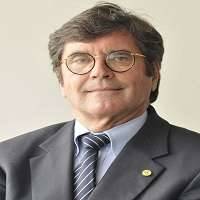
Dieter H. Bimberg PhD
Nanotechnology
Berlin, Berlin, Germany
Connect with the speaker?
Dieter H. Bimberg received the Diploma in physics and the Ph.D. degree from Goethe University, Frankfurt, in 1968 and 1971, respectively. From 1972 to 1979 he held a Principal Scientist position at the Max Planck-Institute for Solid State Research in Grenoble/France and Stuttgart. In 1979 he was appointed as Professor of Electrical Engineering, Technical University of Aachen. Since 1981 he hold the Chair of Applied Solid State Physics at Technical University of Berlin. He was elected in 1990 as Executive Director of the Solid State Physics Institute at TU Berlin, a position he hold until 2011. In 2004 he founded the Center of Nanophotonics at TU Berlin, which he directed until 2015.
From 2006 -2011 he was the chairman of the board of the German Federal Government Centers of Excellence in Nanotechnologies. His honors include the Russian State Prize in Science and Technology 2001, his election to the German Academy of Sciences Leopoldina in 2004, to the Russian Academy of Sciences in 2011, to the American Academy of Engineering in 2014, to the American Academy of Inventors 2016, as Fellow of the American Physical Society and IEEE in 2004 and 2010, respectively, the Max-Born-Award and Medal 2006, awarded jointly by IoP and DPG, the William Streifer Award of the Photonics Society of IEEE in 2010, the UNESCO Nanoscience Award and Medal 2012 and the Heinrich-Welker-Award 2015.
In 2015 he was bestowed the D.Sc.h.c. of the University of Lancaster, UK. Since 2017 he is Einstein Fellow at CIOMP of the Chinese Academy of Sciences. He has authored more than 1500 papers, 26 patents, and 7 books resulting in more than 51,000 citations worldwide and a Hirsch factor of 102 (@ google scholar). His research interests include the growth and physics of nanostructures and nanophotonic devices, ultrahigh speed and energy efficient photonic devices for information systems, single/entangled photon emitters for quantum cryptography and ultimate nanoflash memories based on quantum dots.
From 2006 -2011 he was the chairman of the board of the German Federal Government Centers of Excellence in Nanotechnologies. His honors include the Russian State Prize in Science and Technology 2001, his election to the German Academy of Sciences Leopoldina in 2004, to the Russian Academy of Sciences in 2011, to the American Academy of Engineering in 2014, to the American Academy of Inventors 2016, as Fellow of the American Physical Society and IEEE in 2004 and 2010, respectively, the Max-Born-Award and Medal 2006, awarded jointly by IoP and DPG, the William Streifer Award of the Photonics Society of IEEE in 2010, the UNESCO Nanoscience Award and Medal 2012 and the Heinrich-Welker-Award 2015.
In 2015 he was bestowed the D.Sc.h.c. of the University of Lancaster, UK. Since 2017 he is Einstein Fellow at CIOMP of the Chinese Academy of Sciences. He has authored more than 1500 papers, 26 patents, and 7 books resulting in more than 51,000 citations worldwide and a Hirsch factor of 102 (@ google scholar). His research interests include the growth and physics of nanostructures and nanophotonic devices, ultrahigh speed and energy efficient photonic devices for information systems, single/entangled photon emitters for quantum cryptography and ultimate nanoflash memories based on quantum dots.

